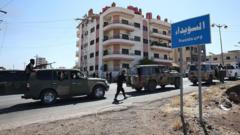The recent fall of Bashar al-Assad's regime has empowered Hayat Tahrir al-Sham to solidify its rule in Idlib, where it has implemented tax systems and maintained civil services to govern effectively.**
Resilience Amidst Turmoil: The Administration of Rebel-Controlled Idlib in Post-Assad Syria**

Resilience Amidst Turmoil: The Administration of Rebel-Controlled Idlib in Post-Assad Syria**
As Syria transitions post-Assad, the rebel group Hayat Tahrir al-Sham has established a governance structure in Idlib, balancing local needs and military operations despite resistance.**
Farmers harvesting olives in Idlib Province, Syria, encounter more than just the toll of nature; they face the tax authority's collection duties as a new norm under the rule of the Islamist group Hayat Tahrir al-Sham (HTS). Pioneering governance in the region since 2017, HTS has implemented stringent tax measures including a mandatory 5% tax on olive oil, leading to localized discontent manifested through protests and occasional violence.
Evolving from a military faction to a governing body amid the power vacuum left by the 54-year Assad ruling dynasty, HTS has adopted an array of civil service functions traditionally associated with state responsibilities. Their administration, dubbed the Syrian Salvation Government, not only collects taxes but manages various revenue-generating enterprises, including fuel sales and telecommunications.
The economic management prowess displayed by HTS has allowed them to bolster their military capacity while providing essential services to the populace, reflecting a pragmatic governance strategy. Observations gathered from local residents, experts, and humanitarian organizations highlight the complexities of rebel leadership during this turbulent transformation of Syria.
The rebel group's control of Idlib is not without controversy; residents report grumbling about the heavy-handed taxation and oversight comparable to a conventional government, even during poor harvests. Nevertheless, HTS continues its efforts to create a semblance of order in a region marred by years of conflict, showcasing a formidable lesson in governance amidst enduring strife.




















